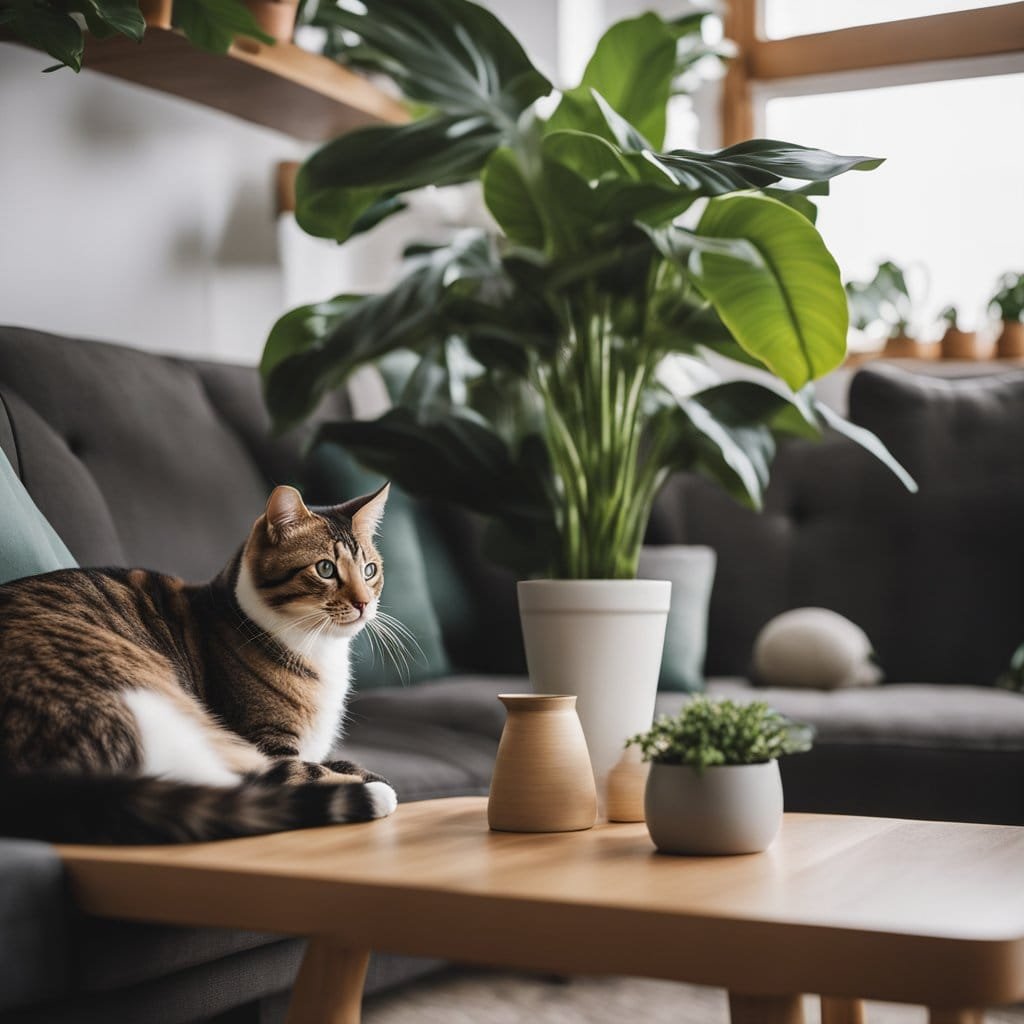
Are Calathea Plants Toxic to Cats and Dogs: Essential Safety Information
When choosing houseplants, the safety of our pets is often a concern. I personally find it important to select plants that won’t harm my furry friends. If you’re worried about whether Calathea plants might be toxic to cats or dogs, you’re not alone.

Calathea plants are non-toxic to both cats and dogs. This makes them a wonderful option for anyone who wants to keep their pets safe. Unlike some houseplants that can cause harm if ingested, Calatheas provide peace of mind.
Having Calathea at home not only beautifies my living space but also reassures me that my pets are safe around them. For those interested in more pet-friendly plant options, Calathea is a great choice, and I invite you to explore how to care for these lovely plants.
The Calathea Plant Overview
When it comes to indoor plants, Calathea is popular among plant enthusiasts for its striking foliage and ability to thrive indoors. Some well-known varieties include the peacock plant, zebra plant, Calathea orbifolia, and Calathea lancifolia.
Characteristics of Calathea Plants
Calathea plants are appreciated for their vibrant leaves with unique patterns and colors. The peacock plant and zebra plant are known for their eye-catching foliage. The broad, striped leaves of the Calathea orbifolia make it a favorite choice for many.
One distinguishing feature of these plants is their sensitivity to light. They prefer indirect sunlight and can suffer from leaf burn if exposed to direct sun. The leaves often fold up at night, creating a dynamic visual change that adds to their charm.
Different Calathea varieties offer diverse appearances. For instance, the Calathea lancifolia, also known as the rattlesnake plant, showcases long, wavy leaves with distinct markings.
Humidity is crucial for these plants. They thrive in moist environments, making them ideal for indoor settings. Regular misting or a nearby humidifier can help meet their moisture needs. Avoid overwatering to prevent root rot, and ensure they receive proper drainage.
Toxicity in Common Houseplants
Many common houseplants can be harmful to cats and dogs, while others are perfectly safe. Recognizing these differences ensures a safer home for pets.
Identifying Toxic Plants
When choosing houseplants, it’s important to know which are harmful to pets. Ivy and Dieffenbachia are notorious for causing illness in animals. Cats or dogs that chew on these plants may experience vomiting or skin irritation. Philodendron can also pose a risk if ingested, leading to similar symptoms. Lilies are particularly dangerous, especially to cats, as they can cause kidney failure. Caladium is another plant that pet owners should be wary of due to its harmful effects.
Understanding what signs to look for, such as drooling, vomiting, or lethargy, can help in quickly addressing any incidents. Keeping an eye on pets around these plants and training them to avoid nibbling can prevent potential problems.
Non-Toxic Alternatives for Pets
For those worried about the safety of their curious pets, there are several non-toxic plants that make great additions to the home. Spider plants are both decorative and safe, allowing for playful pets without worry. Boston Ferns provide lush greenery and are completely safe for household animals. African Violet adds vibrant colors and pose no threat to cats or dogs.
Echeveria and Easter Cactus are also pet-safe options, adding variety to indoor gardens. Azalea and Golden Bamboo, although lovely, are toxic and should be replaced by safer alternatives like Echeveria Elegans. By choosing non-toxic plants, pet owners can enjoy a beautiful home and ensure the health of their companions.
Calathea Toxicity and Pets
I’ve often wondered about the safety of various houseplants with pets around. Calathea plants come up frequently as a choice, mostly because they are known to be non-toxic to both cats and dogs. While this makes them an excellent option for pet-friendly homes, there are still considerations to keep in mind to ensure the safety of your furry friends.
Are Calatheas toxic to cats?
Calatheas are non-toxic to cats, making them a safer choice for households with feline companions. Unlike some other common houseplants that may cause serious harm, Calatheas do not contain toxic compounds that are dangerous to cats. The ASPCA includes Calatheas in its list of non-toxic plants, meaning they pose no severe threat.
However, even a non-toxic plant can cause minor issues. If a cat nibbles on a Calathea leaf, it might experience an upset stomach. While not a poison risk, it is something to watch for. Keeping the plant out of reach can help prevent such incidents. A little care and observation can go a long way in ensuring your pets remain comfortable.
Are Calatheas toxic to dogs?
Calatheas are also non-toxic to dogs, providing a safe environment for dog owners who love indoor plants. These plants do not contain harmful substances that can lead to poisonings and are considered pet-friendly by many. Like cats, dogs might still be inclined to chew on the leaves, thus causing minor digestive issues.
Digestive upset can include mild symptoms such as salivation or vomiting, but these are usually self-limiting. Placing the plant in a location that’s difficult for your dog to reach could reduce these incidents. Encouraging good chewing behaviors with approved toys might help deter interest in the plant altogether.
Preventing Incidents with Curious Pets
Even with non-toxic houseplants like Calateas, preventive measures can be helpful. Some pets are naturally curious and may explore plants out of boredom or interest. Organizing your plant collection strategically can help. Place pet-friendly plants like Calatheas on higher shelves or surfaces out of your pets’ usual reach.
An alternative can be using an indoor garden fence to create a barrier. Keeping your pets entertained and properly exercised helps as well—it can reduce their curiosity about the plants. Regular check-ins with resources like the ASPCA Animal Poison Control Center are also useful for staying informed about new plant safety updates.
Pet Safety and Plant Care
Keeping pets safe around plants involves careful planning and attention. I look at how to create a safe indoor space and what actions to take if a pet ingests harmful plants. Both parts help maintain a peaceful home for everyone.
Creating a Safe Indoor Environment
To make your home safe for pets and plants like Calathea, I recommend being mindful of plant locations. Placing plants on high shelves or in hanging baskets can help keep them out of reach of curious cats and dogs. Calathea plants are known to be non-toxic to pets, including dogs and cats, according to the ASPCA.
Some other pet-friendly plants to consider adding are the Chinese money plant and prayer plants. On the other hand, make sure that plants with calcium oxalate crystals, like peace lilies, are well out of reach, as they can cause irritation if chewed by pets.
What to Do If a Pet Ingests Plants
If your pet ingests a plant, staying calm allows you to act swiftly. First, remove any plant material from your pet’s mouth and observe them for any signs of distress. Call the Animal Poison Control Center for professional advice if you are concerned.
Even though Calathea plants are considered safe, it’s best to monitor your pet’s behavior. If you notice symptoms such as vomiting or lethargy, contacting your vet becomes necessary. For peace of mind, familiarize yourself with both toxic and non-toxic plants your pet might encounter like fishpole bamboo or chickens and hens, which are generally safe options.
Frequently Asked Questions
Calathea plants are popular among pet owners because they are generally non-toxic to cats and dogs. Although they are safe, monitoring your pet’s interaction with the plant is essential to prevent any unwanted reactions.
What happens if a cat ingests parts of a Calathea plant?
If a cat consumes any part of a Calathea, it might experience mild irritation. Sometimes, the cat might show signs like drooling or a slight upset stomach. It’s generally harmless, but I would keep an eye on my cat to ensure it’s comfortable.
Can Calathea plants cause harm to pets if they consume it?
Calathea plants contain no harmful toxins for pets. While they aren’t dangerous, eating them could cause mild digestive discomfort in animals like cats and dogs. It’s always wise to keep plants out of reach of curious pets.
How does Calathea affect dogs when they come into contact with it?
When dogs come into contact with Calathea plants, they usually don’t experience any harmful effects. However, if they chew on the leaves, they might have mild gastrointestinal discomfort, which doesn’t last long.
Are any Calathea species dangerous to household pets?
All Calathea species are considered non-toxic to household pets. If my pet likes munching on plants, I’d still watch their behavior and ensure they don’t develop any discomfort.
What are the symptoms of Calathea ingestion in cats or dogs?
After ingesting Calathea, pets might show symptoms such as slight drooling or an upset stomach. These symptoms are usually mild. If I notice prolonged issues, I’d consult a veterinarian.
What should I do if my pet has eaten part of a Calathea?
If my pet eats part of a Calathea, I should ensure they have access to water and observe any symptoms. Most likely, they’ll be fine, but if any symptoms persist or worsen, contacting a vet is advisable.










